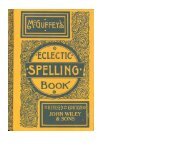WINE, WOMEN, AND SONG. - The Language Realm
WINE, WOMEN, AND SONG. - The Language Realm
WINE, WOMEN, AND SONG. - The Language Realm
You also want an ePaper? Increase the reach of your titles
YUMPU automatically turns print PDFs into web optimized ePapers that Google loves.
A third point worthy of attention is, that a certain breath of paganism, wafting perfumes from the<br />
old mythology, whispering of gods in exile, encouraging men to accept their life on earth with<br />
genial enjoyment, was never wholly absent during the darkest periods of the Middle Ages. This<br />
inspiration uttered itself in Latin; for we have little reason to believe that the modern languages<br />
had yet attained plasticity enough for the expression of that specific note which belongs to the<br />
Renaissance—the note of humanity conscious of its GræcoRoman pagan past. This Latin,<br />
meanwhile, which it employed was fabricated by the Church and used by men of learning.<br />
VII.<br />
<strong>The</strong> songs of the Wandering Students were in a strict sense moduli as distinguished from versus;<br />
popular and not scholastic. <strong>The</strong>y were, however, composed by men of culture, imbued with<br />
classical learning of some sort, and prepared by scholarship for the deftest and most delicate<br />
manipulation of the Latin language.<br />
Who were these Wandering Students, so often mentioned, and of whom nothing has been as yet<br />
related? As their name implies, they were men, and for the most[17] part young men, travelling<br />
from university to university in search of knowledge. Far from their homes, without<br />
responsibilities, light of purse and light of heart, careless and pleasureseeking, they ran a free,<br />
disreputable course, frequenting taverns at least as much as lecturerooms, more capable of<br />
pronouncing judgment upon wine or women than upon a problem of divinity or logic. <strong>The</strong><br />
conditions of medieval learning made it necessary to study different sciences in different parts of<br />
Europe; and a fixed habit of unrest, which seems to have pervaded society after the period of the<br />
Crusades, encouraged vagabondage in all classes. <strong>The</strong> extent to which travelling was carried in<br />
the Middle Ages for purposes of pilgrimage and commerce, out of pure curiosity or love of<br />
knowledge, for the bettering of trade in handicrafts or for selfimprovement in the sciences, has<br />
only of late years been estimated at a just calculation. "<strong>The</strong> scholars," wrote a monk of<br />
Froidmont in the twelfth century, "are wont to roam around the world and visit all its cities, till<br />
much learning makes them mad; for in Paris they seek liberal arts, in Orleans authors, at Salerno<br />
gallipots, at Toledo demons, and in no place decent manners."<br />
<strong>The</strong>se pilgrims to the shrines of knowledge formed a class apart. <strong>The</strong>y were distinguished from<br />
the secular and religious clergy, inasmuch as they had taken no orders, or only minor orders, held<br />
no benefice or cure, and had entered into no conventual community. <strong>The</strong>y were still more<br />
sharply distinguished from the laity,[18] whom they scorned as brutes, and with whom they seem<br />
to have lived on terms of mutual hostility. One of these vagabond gownsmen would scarcely<br />
condescend to drink with a townsman:[6]—<br />
"In aeterno igni<br />
Cruciantur rustici, qui non sunt tam digni<br />
Quod bibisse noverint bonum vinum vini."<br />
"Aestimetur laicus ut brutus,<br />
Nam ad artem surdus est et mutus."



